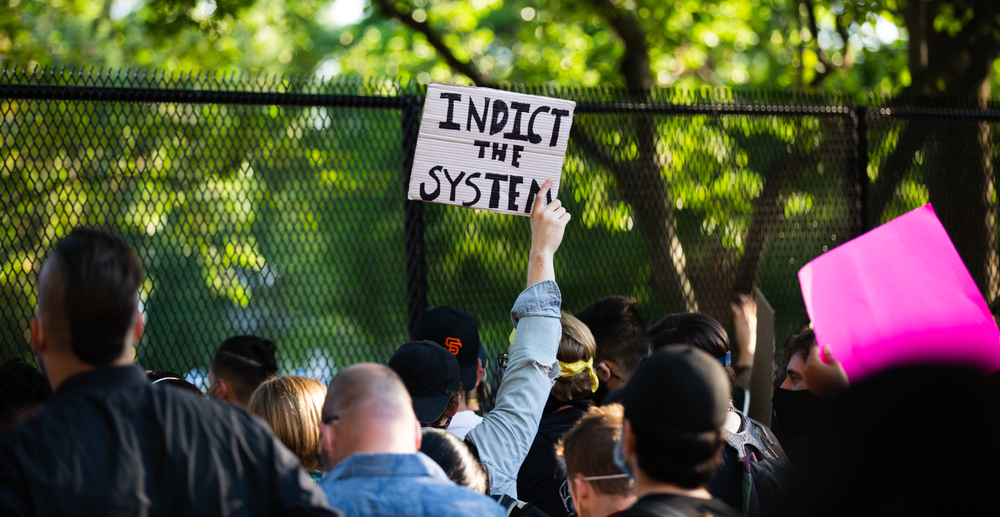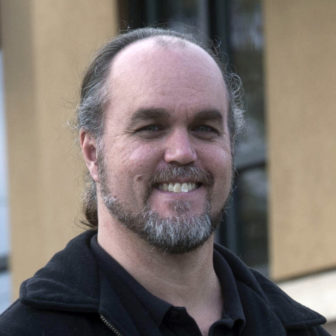
Johnny Silvercloud/Shutterstock
.
Calls for racial justice have reached a critical level in the U.S. and the world. This moment, which to many people seemed to arrive suddenly, is less surprising to those who study conflict and violence. In our current conditions, the killings of George Floyd and others created the spark for protest and uprising, but the fuel is centuries of ongoing oppression and violence.
As destabilizing as this moment seems to many, it also offers hope. Longtime prison abolitionist Angela Davis recently said, “This is an extraordinary moment. I have never experienced anything like the conditions we are currently experiencing, the conjuncture created by the COVID-19 pandemic and the recognition of the systemic racism that has been rendered visible under these conditions because of the disproportionate deaths in Black and Latinx communities. And this is a moment I don’t know whether I ever expected to experience.”

John Lash
It’s not surprising that police killings have been centered in these latest calls for justice, since they are the most easily seen manifestation of state violence against Black people. Calls to defund the police have become more widespread, and suddenly a long-time radical commitment to dismantling the criminal justice system is having an influence on mainstream politics.
In the context of the latest uprisings and protests across the country, defunding has caught on as a method of correcting the violence and excesses of policing across the nation. Unsurprisingly, the very idea of less funding for the police provoked strong reactions on the right, but even on the left there is an inherent distrust of the idea.
Presidential candidate Joe Biden is clear in his opposition to the idea, and proposes more money to support police reform. A recent Politico article lays out the history of the idea and its current permutations, and while it is clear that few will adopt the positions of abolitionists like Mariame Kaba, most advocates see certain current functions of the police being replaced by other professions.
Whatever approach we end up taking, we have to be careful to consider that our solutions don’t simply replicate the problem. One of my mentors in restorative justice, Dominic Barter, teaches that if we don’t consciously create new justice systems together, we tend to recreate the ones we carry unconsciously. In this nation, all our institutions are built on a platform of white supremacy. This means that we need to examine how and with whom we replace police.
Consider recent coverage of child welfare in New Mexico. The state, which ranked 50th in child welfare in 2019, has struggled for years to bring safe and equitable treatment and care to youth, including Black youth. Years of replacing programs or personnel did not produce the desired results, and it has taken lawsuits and legislation to get to the current point of promising change.
Whether these remedies improve the lot of children there remains to be seen, but it is clear that even those dedicated to child welfare can reproduce structural violence. The same dynamics play out in other fields as well, including education, social work and psychiatry.
As disquieting as it may be to consider, all our institutions are likely to recreate oppressive and unjust outcomes if we don’t examine them carefully. For those who blame police, it means there is more to the solution than simply defunding. In this moment, when change is possible, we have to do the hard work of examining all our institutions, especially the ones in which we live and work. We have to consider what comes next, and perhaps more importantly, its origin.
In this work it will behoove us to center the voices of the most marginalized, those who are most often victims of our society’s many forms of violence. We have lots to do, but if we don’t want to replicate the same problems with a new facade, we have to start by listening to these voices.
John Lash, a Ph.D. student studying restorative justice and racial disproportionality, was director of Georgia Conflict Center from 2012 to 2019. His interest in nonviolence, restorative justice and community-based peacebuilding began during his nearly 25 years as a prisoner in Georgia.





























